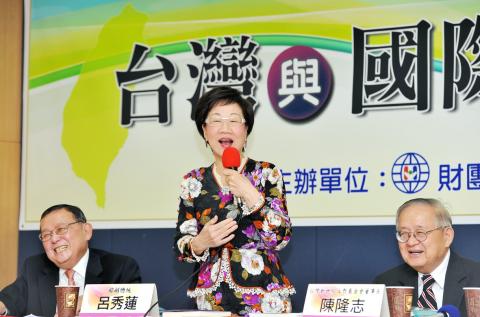Former vice president Annette Lu (呂秀蓮) yesterday reiterated her contention that Taiwan has been an independent country since the nation’s first-ever presidential election was held on March 23, 1996, while its name remained the Republic of China (ROC).
The ROC representing Taiwan was different from the ROC established in 1912 in China because the latter was overthrown by the Chinese Communist Party, which announced the creation of the People’s Republic of China in 1949, Lu said.
“The ROC created in 1912 represented China, and that in 1996 represented Taiwan. Same name, but different entities,” she said.

Photo: Chien Jung-fong, Taipei Times
Lu made the remarks at a forum dedicated to a newly published book that explores ways for Taiwan to join international organizations written by Chen Lung-fong (陳隆豐), doctor of juridical science at New York University School of Law.
The book starts with questions related to the country’s sovereignty, to which Lu gave her answers.
In 1996, 23 million Taiwanese realized “popular sovereignty” by voting in the presidential election, with the help of the US, which dispatched two aircraft carrier battle groups to the Taiwan Strait in response to a series of missile tests and military exercises launched by China to intimidate Taiwan, Lu said.
The 1996 election showed that China had already failed to stop Taiwan from becoming an independent country, Lu said.
It also showed that the US did not oppose the nation’s independence as it has claimed, Lu added.
“Taiwanese independence was achieved in 1996,” she said.
Former deputy minister of foreign affairs Michael Kao (高英茂), who served under the Democratic Progressive Party administration, agreed with Lu that Taiwan meets the criteria for the Westphalian model of sovereignty — territoriality and the absence of a role for external agents in domestic structures — and the criteria set out by the Montevideo Convention on the Rights and Duties of States.
Kao said that two problems needed to be overcome for Taiwan to enjoy statehood status as other nations do: the lack of recognition in the world due to political issues and ambiguity on the part of Taiwanese about their national identity.
The policies pursued by President Ma Ying-jeou (馬英九) since he took office in 2008 in the areas of diplomacy and cross-strait relations and characterized by “diplomatic truce,” the so-called “1992 consensus” and “one country, two areas (一國兩區)” have all hampered people’s awareness of Taiwan’s national identity, Kao said.
Kao said he recently talked to former US deputy secretary of state Jim Steinberg and told him that the US should have made more effort to assist Taiwan’s participation in international organizations, to which Steinberg replied that the US respected the choice Taiwanese made in the presidential election.
Steinberg’s reply showed how important it is to raise awareness of national identity in the pursuit of the normalization of Taiwan’s status, Kao said.

Chinese Nationalist Party (KMT) Chairman Eric Chu (朱立倫), spokeswoman Yang Chih-yu (楊智伃) and Legislator Hsieh Lung-chieh (謝龍介) would be summoned by police for questioning for leading an illegal assembly on Thursday evening last week, Minister of the Interior Liu Shyh-fang (劉世芳) said today. The three KMT officials led an assembly outside the Taipei City Prosecutors’ Office, a restricted area where public assembly is not allowed, protesting the questioning of several KMT staff and searches of KMT headquarters and offices in a recall petition forgery case. Chu, Yang and Hsieh are all suspected of contravening the Assembly and Parade Act (集會遊行法) by holding

PRAISE: Japanese visitor Takashi Kubota said the Taiwanese temple architecture images showcased in the AI Art Gallery were the most impressive displays he saw Taiwan does not have an official pavilion at the World Expo in Osaka, Japan, because of its diplomatic predicament, but the government-backed Tech World pavilion is drawing interest with its unique recreations of works by Taiwanese artists. The pavilion features an artificial intelligence (AI)-based art gallery showcasing works of famous Taiwanese artists from the Japanese colonial period using innovative technologies. Among its main simulated displays are Eastern gouache paintings by Chen Chin (陳進), Lin Yu-shan (林玉山) and Kuo Hsueh-hu (郭雪湖), who were the three young Taiwanese painters selected for the East Asian Painting exhibition in 1927. Gouache is a water-based

Taiwan would welcome the return of Honduras as a diplomatic ally if its next president decides to make such a move, Minister of Foreign Affairs Lin Chia-lung (林佳龍) said yesterday. “Of course, we would welcome Honduras if they want to restore diplomatic ties with Taiwan after their elections,” Lin said at a meeting of the legislature’s Foreign Affairs and National Defense Committee, when asked to comment on statements made by two of the three Honduran presidential candidates during the presidential campaign in the Central American country. Taiwan is paying close attention to the region as a whole in the wake of a

OFF-TARGET: More than 30,000 participants were expected to take part in the Games next month, but only 6,550 foreign and 19,400 Taiwanese athletes have registered Taipei city councilors yesterday blasted the organizers of next month’s World Masters Games over sudden timetable and venue changes, which they said have caused thousands of participants to back out of the international sporting event, among other organizational issues. They also cited visa delays and political interference by China as reasons many foreign athletes are requesting refunds for the event, to be held from May 17 to 30. Jointly organized by the Taipei and New Taipei City governments, the games have been rocked by numerous controversies since preparations began in 2020. Taipei City Councilor Lin Yen-feng (林延鳳) said yesterday that new measures by